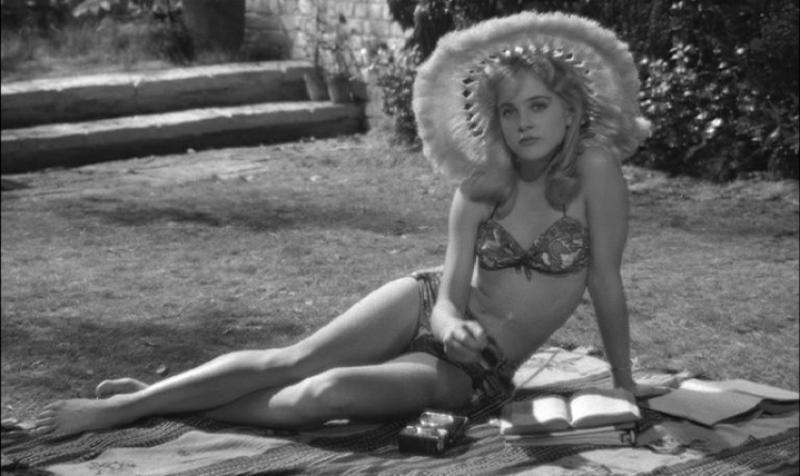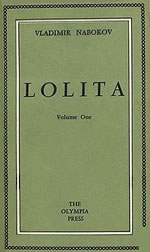How Do You Solve a Problem Like Lolita?, BBC Four | reviews, news & interviews
How Do You Solve a Problem Like Lolita?, BBC Four
How Do You Solve a Problem Like Lolita?, BBC Four
Documentary asks if Nabokov really did thank heaven for little girls

A penny for the author’s thoughts. An opening montage makes it quite clear that Vladimir Nabokov had no truck with witless modernity. Yet here nonetheless is a documentary on his infamous bestseller, and they've gone and named after a TV talent show about the hunt for an actress to play a singing nun in a West End musical. Why? Was the idea to interest Sound of Music fans in Lolita?
Perhaps Nabokov would have chuckled. After a lifetime of wandering, he did spend his last years among the selfsame hills hymned by Julie Andrews. In 1962, the year Stanley Kubrick's film of Lolita was released, he was filmed by the BBC in the shadow of the Matterhorn, an old man in shorts indulging a lifelong passion for chasing delicate creatures with a large net. In this case butterflies.
Nabokov was perhaps the first great writer to be seduced by the siren wail of television. He allowed himself to be interviewed frequently down the years, in German, French and English. The BBC would always send their best men. James Mossman grilled him in London in 1969, then Robert Robinson met him in Montreux on Valentine’s Day 1977, the year of the author’s death. It’s a rich archive for documentary makers to plunder, which at least partly explains why there have been at least three British television documentaries since then, including 20 years ago an Omnibus about the creation of Lolita.
It wasn’t just Nabokov who profited from Humbert Humbert’s illicit desires
Here was another, timed to coincide with the publication of Nabokov’s last unfinished work, The Original of Laura. Not that there was much on that here. Stephen Smith, who wrote and presented this latest documentary, did recently report on it for Newsnight. But among modern viewers, there’s only one thing they mention about Nabokov at the water cooler: that he wrote a saucy book about interfering with an underage girl.
It’s a function of the age of invasive moral protection that the book needs rescuing again. “I want to be able to feel comfortable with it,” said Smith, “and yet I can’t.” On the very weekend How Do You Solve a Problem Like Lolita? was broadcast, the government announced a climbdown on its plans to make more or less anyone who comes into contact with children prove they’re not a nonce. Even so, had Nabokov been alive today they still probably wouldn’t have let him read in schools. Hence the premise of this film. Smith set himself the task of proving once and for all that Lolita is indeed a moral book.
This entailed a good deal of travel. It’s good to know that the BBC will still spend money on literary investigation. Smith’s itinerary reads like a 007 location recce: Lake Geneva, St Petersburg, Cambridge, Berlin, New York. What resulted was as much a film about the merits of literary pilgrimage as a pilgrimage itself. In the abandoned family pile now crumbling in state ownership in the Russian countryside Smith thought he could discern a Nabokovian hint of “black comedy cemented into the frame of the place”. He got very excited standing in a garden in upstate New York where the manuscript of Lolita – the incriminating evidence - was very nearly incinerated.
 But what finally does it tell us that, for an extortionate tariff, Lolita’s devotees can book themselves into the very Swiss hotel room where its creator lived out his days? That the proximity of genius is intoxicating? “That’s his desk,” said Smith, putting down his suitcase. Above hung a photograph of Nabokov working at it. It wasn’t just Nabokov who profited from Humbert Humbert’s illicit desires.
But what finally does it tell us that, for an extortionate tariff, Lolita’s devotees can book themselves into the very Swiss hotel room where its creator lived out his days? That the proximity of genius is intoxicating? “That’s his desk,” said Smith, putting down his suitcase. Above hung a photograph of Nabokov working at it. It wasn’t just Nabokov who profited from Humbert Humbert’s illicit desires.
As usual Martin Amis was on hand to comment on the troublesome business of reading books about fancying pubescent girls. “I’m afraid this does distort the corpus,” he drawled. “It’s an embarrassment. He liked the idea of it too much.” Not every interviewee had so much to contribute. The barman in Montreux reckoned Mrs Nabokov did half the work anyway. The academic who occupies Nabokov’s old faculty office in Cornell noted that, about twice a year, one pilgrim or another will knock on his door and burst into tears. No sign of that from Smith, mind, although he seemed highly chuffed when the literary editor of Playboy noted a resemblance between him and his subject.
In fact the person the programme made him look like was Michael Palin - and just in the nick of time, given what we know now what the BBC thinks of its globetrotting presenter. This was a literary film for our times. There was much grammatical monkey business to do with getting into cabs and onto bikes and, in homage to Smith's goalkeeping subject, putting on football kit and playing between the sticks.
These days we must grin and bear these moronic tropes even from Newsnight reporters. But the accumulation of all those air miles did have point: it helped to show how Nabokov’s nostalgia for an irrecoverable youth might have mutated on the page into the wrong kind of yearning. And all these years later that glorious archive material is not just for decoration. Asked by an interviewer if he’d ever known a girl like Lolita, the old man’s lizard eyes flickered, and just for a second the body language spoke as eloquently as anything Nabokov ever wrote in his adoptive tongue.
Watch a clip from Kubrick's Lolita on YouTube:
Add comment
The future of Arts Journalism
You can stop theartsdesk.com closing!
We urgently need financing to survive. Our fundraising drive has thus far raised £33,000 but we need to reach £100,000 or we will be forced to close. Please contribute here: https://gofund.me/c3f6033d
And if you can forward this information to anyone who might assist, we’d be grateful.

Subscribe to theartsdesk.com
Thank you for continuing to read our work on theartsdesk.com. For unlimited access to every article in its entirety, including our archive of more than 15,000 pieces, we're asking for £5 per month or £40 per year. We feel it's a very good deal, and hope you do too.
To take a subscription now simply click here.
And if you're looking for that extra gift for a friend or family member, why not treat them to a theartsdesk.com gift subscription?
more TV
 Your Friends & Neighbors, Apple TV+ review - in every dream home a heartache
Jon Hamm finds his best role since 'Mad Men'
Your Friends & Neighbors, Apple TV+ review - in every dream home a heartache
Jon Hamm finds his best role since 'Mad Men'
 MobLand, Paramount+ review - more guns, goons and gangsters from Guy Ritchie
High-powered cast impersonates the larcenous Harrigan dynasty
MobLand, Paramount+ review - more guns, goons and gangsters from Guy Ritchie
High-powered cast impersonates the larcenous Harrigan dynasty
 This City is Ours, BBC One review - civil war rocks family cocaine racket
Terrific cast powers Stephen Butchard's Liverpool drug-ring saga
This City is Ours, BBC One review - civil war rocks family cocaine racket
Terrific cast powers Stephen Butchard's Liverpool drug-ring saga
 The Potato Lab, Netflix review - a K-drama with heart and wit
Love among Korean potato-researchers is surprisingly funny and ideal for Janeites
The Potato Lab, Netflix review - a K-drama with heart and wit
Love among Korean potato-researchers is surprisingly funny and ideal for Janeites
 Adolescence, Netflix review - Stephen Graham battles the phantom menace of the internet
How antisocial networks lead to real-life tragedy
Adolescence, Netflix review - Stephen Graham battles the phantom menace of the internet
How antisocial networks lead to real-life tragedy
 Drive to Survive, Season 7, Netflix review - speed, scandal and skulduggery in the pitlane
The F1 documentary series is back on the pace
Drive to Survive, Season 7, Netflix review - speed, scandal and skulduggery in the pitlane
The F1 documentary series is back on the pace
 A Cruel Love: The Ruth Ellis Story, ITV1 review - powerful dramatisation of the 1955 case that shocked the public
Lucy Boynton excels as the last woman to be executed in Britain
A Cruel Love: The Ruth Ellis Story, ITV1 review - powerful dramatisation of the 1955 case that shocked the public
Lucy Boynton excels as the last woman to be executed in Britain
 Towards Zero, BBC One review - more entertaining parlour game than crime thriller
The latest Agatha Christie adaptation is well cast and lavishly done but a tad too sedate
Towards Zero, BBC One review - more entertaining parlour game than crime thriller
The latest Agatha Christie adaptation is well cast and lavishly done but a tad too sedate
 Bergerac, U&Drama review - the Jersey 'tec is born again after 34 years
Damien Molony boldly follows in the hallowed footsteps of John Nettles
Bergerac, U&Drama review - the Jersey 'tec is born again after 34 years
Damien Molony boldly follows in the hallowed footsteps of John Nettles
 A Thousand Blows, Disney+ review - Peaky Blinders comes to Ripper Street?
The prolific Steven Knight takes us back to a squalid Victorian London
A Thousand Blows, Disney+ review - Peaky Blinders comes to Ripper Street?
The prolific Steven Knight takes us back to a squalid Victorian London
 Zero Day, Netflix review - can ex-President Robert De Niro save the Land of the Free?
Panic and paranoia run amok as cyber-hackers wreak havoc
Zero Day, Netflix review - can ex-President Robert De Niro save the Land of the Free?
Panic and paranoia run amok as cyber-hackers wreak havoc
 The White Lotus, Series 3, Sky Atlantic review - hit formula with few surprises but a new bewitching soundtrack
Thailand hosts the latest bout of Mike White's satirical takedown of the rich and privileged
The White Lotus, Series 3, Sky Atlantic review - hit formula with few surprises but a new bewitching soundtrack
Thailand hosts the latest bout of Mike White's satirical takedown of the rich and privileged

Comments
...
...
...
...